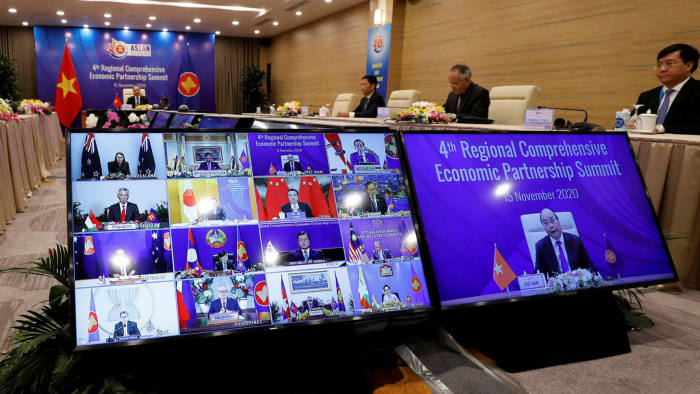
Fifteen Asian countries along with Australia and New Zealand have formally signed the China backed Regional Comprehensive Economic Partnership (RCEP) at the regional summit in Hanoi. The agreement to lower tariffs and open up the services trade within the RCEP. Excluding the United States from the pact is viewed as a Chinese-led alternative to a now-defunct Washington trade initiative. India pulled out of RCEP talks in November last year, but ASEAN leaders have said the door remained open for it to join.
First proposed in 2011 at the summit in Bali, the agreement was finally signed at a virtual ASEAN Summit on 15 November 2020. The deal is important as the countries part of the pact are trying to get their pandemic-hit economies back on track. The arrangement will also be open to any other external economic partners, such as nations in Central Asia and remaining nations in South Asia and Oceania.
RCEP potentially includes more than 3 billion people or 45% of the world’s population, and a combined GDP of about $21.3 trillion, accounting for about 40 percent of world trade. However, experts say that India’s decision to not join RCEP has reduced its potential impact significantly. On 4 November 2019, India opted out of RCEP in ASEAN+3 summit, saying that the deal will have an adverse impact on its citizens as its key concerns were not addressed. India had expressed concerns of dumping of manufactured goods from China and agricultural and dairy products from Australia and New Zealand, affecting its own domestic industrial and farming sectors. None of these concerns were addressed by the RCEP.
Prime Minister Narendra Modi in his address at the RCEP summit in Bangkok had said “The present form of the RCEP Agreement does not fully reflect the basic spirit and the agreed guiding principles of RCEP. It also does not address satisfactorily India’s outstanding issues and concerns. In such a situation, it is not possible for India to join RCEP Agreement”. In light of India’s exit from the RCEP, Japan and China had called on India to rejoin the partnership.
Commerce and industry minister Piyush Goyal said the decision not to join RCEP will boost ‘Make in India’ as he lauded Prime Minister Narendra Modi for his “bold and courageous decision to not join RCEP, since it was against our economic interests and national priorities”.
Observers say it solidifies China’s broader geopolitical ambitions in the region, as has faced little competition from the US since President Donald Trump pulled out of a trade pact of its own. The US backed pact called the Trans-Pacific Partnership (TPP), was to be the world’s biggest trade pact, until Washington pulled out of the same saying it funnelled off US jobs. A Joe Biden led US government however could have a different take on the deal say observers.
Critics of the RCEP have said that its efficacy is limited as it is not as extensive or comprehensive as the TPP nor is it a rationalised agreement. The pact will take effect once the majority of the participating countries ratify the agreement domestically within the next two years.
